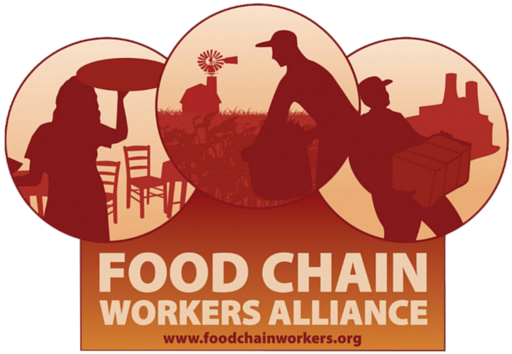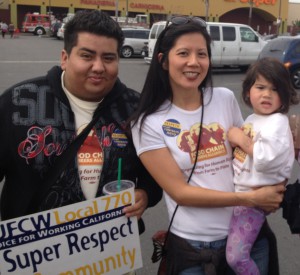Quisque luctus nec sem quis vestibulum. Sed neque est, ornare eu laoreet in, molestie vitae augue. Read More
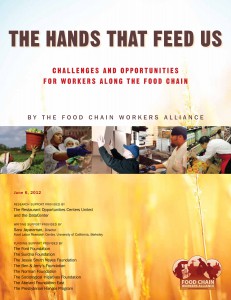 June 6, 2012 – Today, the Food Chain Workers Alliance releases a new report, The Hands That Feed Us: Challenges and Opportunities for Workers Along the Food Chain, the first of its kind that looks at wages and working conditions of workers across the entire food chain – a sector that employs 20 million people in the U.S., comprising one-sixth of the nation’s workforce.
June 6, 2012 – Today, the Food Chain Workers Alliance releases a new report, The Hands That Feed Us: Challenges and Opportunities for Workers Along the Food Chain, the first of its kind that looks at wages and working conditions of workers across the entire food chain – a sector that employs 20 million people in the U.S., comprising one-sixth of the nation’s workforce.
The Hands That Feed Us is based on nearly 700 surveys and interviews with workers and employers in food production, processing, distribution, retail and service, which collectively sell over $1.8 trillion dollars in goods and services annually, accounting for over 13 percent of the nation’s Gross Domestic Product.
According to our report, there are some good jobs in the food system (13.5% of workers surveyed earn livable wages), but the vast majority are incredibly low-wage, with little or no access to paid sick days and health benefits, with dire 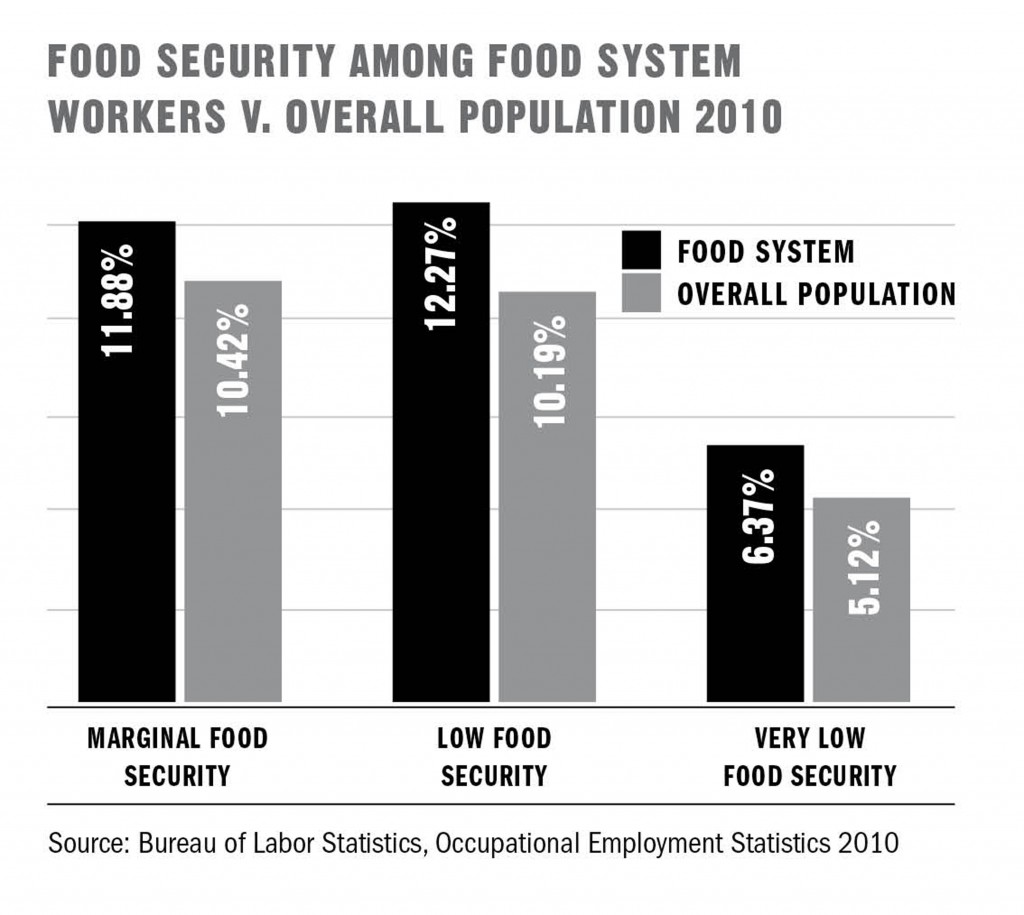 consequences for consumers. More than 86 percent of workers reported earning subminimum, poverty, and low wages, resulting in a sad irony: food workers face higher levels of food insecurity, or the inability to afford to eat, than the rest of the U.S. workforce.
consequences for consumers. More than 86 percent of workers reported earning subminimum, poverty, and low wages, resulting in a sad irony: food workers face higher levels of food insecurity, or the inability to afford to eat, than the rest of the U.S. workforce.
You can download the full report, the executive summary, and the executive summary in Spanish. If you would like a hard copy of any of these, please contact us at info (at) foodchainworkers.org.
The Hands That Feed Us examines the five core food occupations and industries in the food system: farmworkers (production), slaughterhouse and other processing facilities workers (processing), warehouse workers (distribution), grocery store workers (retail), and restaurant and food service workers (service). It examines how corporate consolidation throughout the food chain has created universal impacts on workers in terms of low wages, small to midsize employers in terms of unfair competition, and consumers in terms of food quality and diversity. Employers interviewed unanimously commented on how multinational food corporations receiving government subsidies and tax breaks and buying up their own suppliers has created unfair and unmanageable competition.
In addition to examples of poor work environments, the report also highlights fair business practices and steps that policymakers, consumers, and employers can take to improve conditions for food system workers.
Key Findings from The Hands That Feed Us:
Lack of Benefits: Seventy-nine percent of food system workers do not have a single paid sick day, or do not know if they have paid sick days, and 58 percent lack health coverage. Consequently, 53 percent have admitted to working while sick.
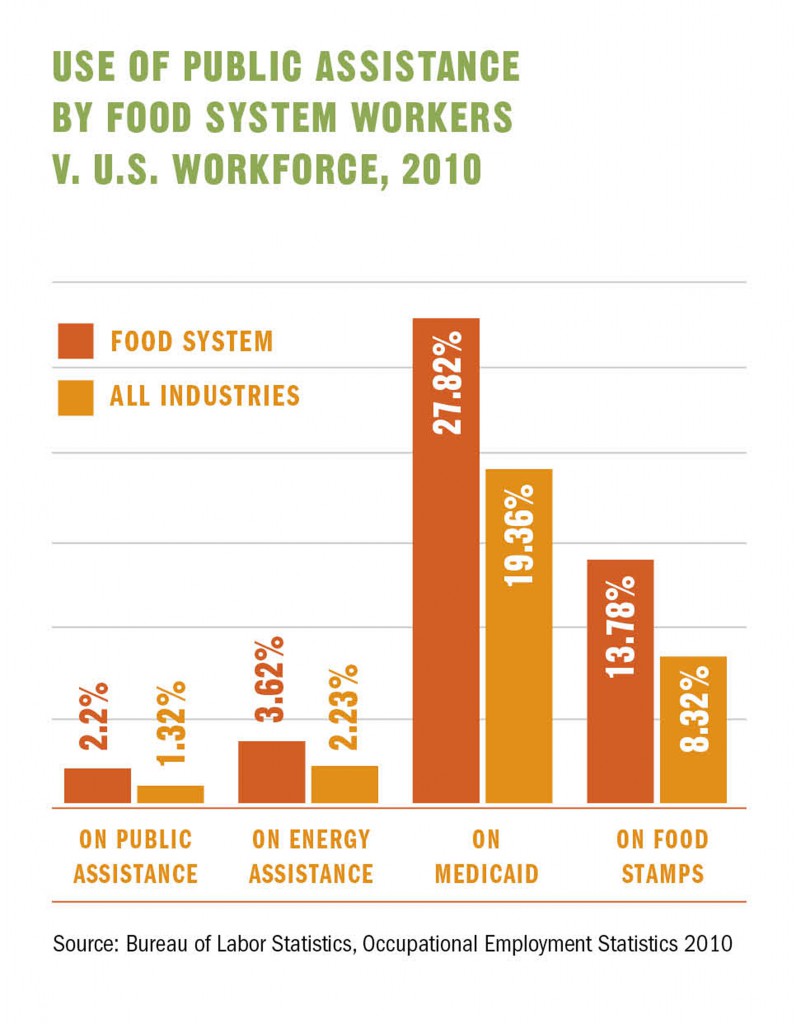 Reliance on Public Support: Food system workers use food stamps at one-and-a-half times the rate of the rest of the U.S. workforce. Food industry employees are also more likely receive Medicaid than other industries. Nearly 28% of food system employees are on Medicaid, compared to 19.36% of all industries. Due to a lack of employer-provided health benefits, more than one third of all workers surveyed (34.8%) report using the emergency room for primary health care. In addition, 80 percent of these workers are unable to pay for such care.
Reliance on Public Support: Food system workers use food stamps at one-and-a-half times the rate of the rest of the U.S. workforce. Food industry employees are also more likely receive Medicaid than other industries. Nearly 28% of food system employees are on Medicaid, compared to 19.36% of all industries. Due to a lack of employer-provided health benefits, more than one third of all workers surveyed (34.8%) report using the emergency room for primary health care. In addition, 80 percent of these workers are unable to pay for such care.
Poor Quality of Life: A full 10 percent reported working more than 10 hours per day, and the vast majority of those reported working 60 or more hours per week. Almost half of the workers also reported working multiple jobs to make ends meet.
Lack of Upward Mobility: Despite taking on more duties, 81 percent never received a promotion.
Improper Safety Training: More than half of all workers surveyed (52 percent) reported that they did not receive health and safety training from their employers. Almost one-third of all food system workers (32.7%) reported that their employers did not always provide necessary equipment to do their jobs. A majority of workers (57.2%) reported suffering an injury or illness on the job.
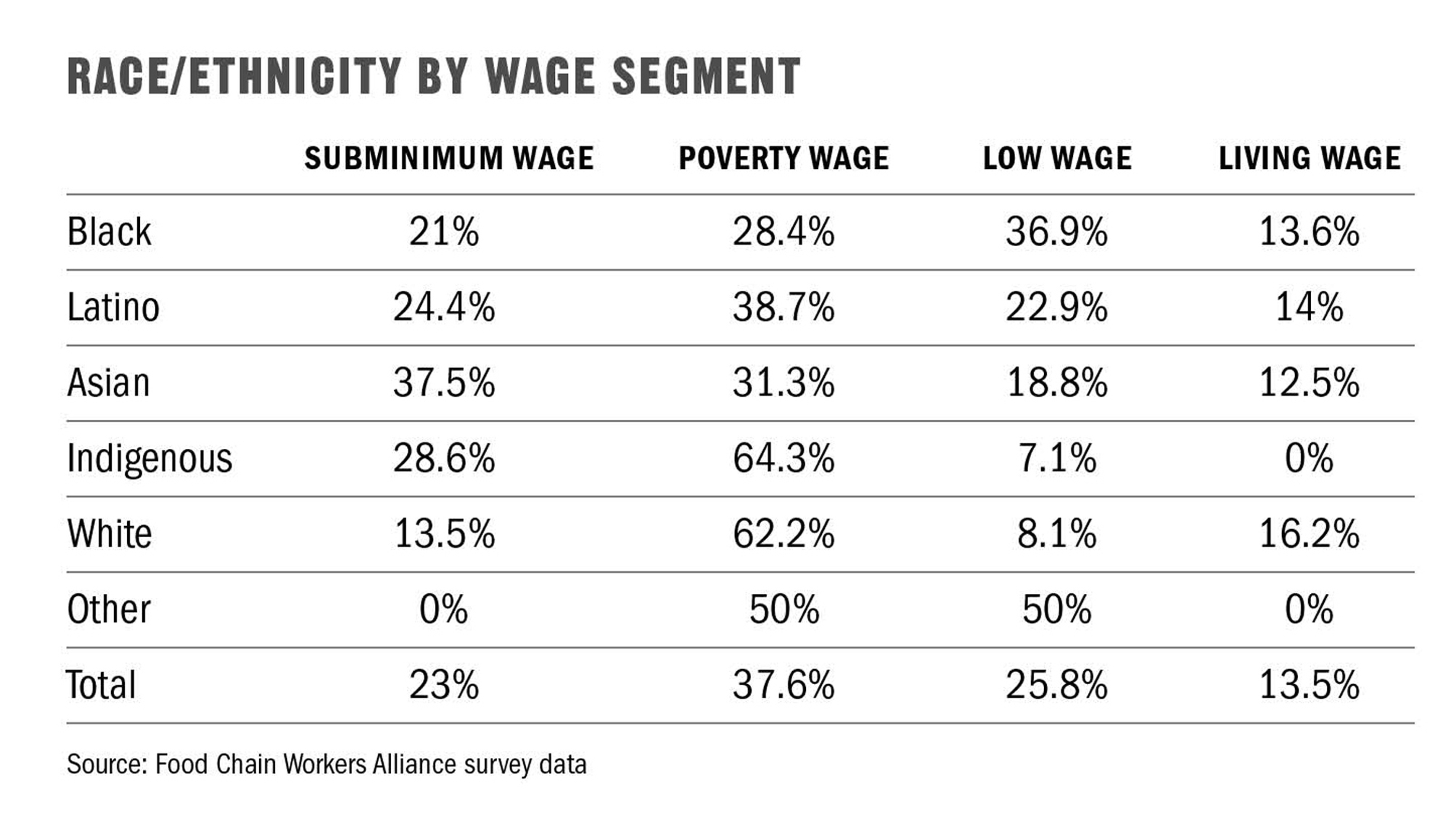 Gender and Race Discrimination: While about one quarter of Black and Latino workers and almost 40 percent of Asian workers reported earning less than the minimum wage, only 13.5 percent of white workers surveyed reported earning less than the minimum wage. Not surprisingly given these differences, more than one third of workers surveyed reported feeling that they had been discriminated against by their employer. Women food system workers take home slightly less than men in the food system; women earn median weekly wages of $400, while men reported a median weekly take-home of $421.
Gender and Race Discrimination: While about one quarter of Black and Latino workers and almost 40 percent of Asian workers reported earning less than the minimum wage, only 13.5 percent of white workers surveyed reported earning less than the minimum wage. Not surprisingly given these differences, more than one third of workers surveyed reported feeling that they had been discriminated against by their employer. Women food system workers take home slightly less than men in the food system; women earn median weekly wages of $400, while men reported a median weekly take-home of $421.
There are answers: There is tremendous potential to engage consumers, small-to-midsize employers and workers to change the food system for all. For starters policymakers can increase the minimum wage and guarantee workers health benefits and the right to organize. Consumers can support businesses that are providing livable wages and benefits, and speak out against those that are not. Employers can increase wages and benefits; adopt systematic and fair hiring and promotion practices; and adopt benefits, such as paid sick days, that would allow employees to care for themselves and their families.
Read The Hands That Feed Us for more detailed recommendations for policymakers, consumers, and employers!
Help us connect with consumers! Take our GoodMaker Challenge and submit an idea for a creative way to educate consumers! Click here for more info!
Check out the media coverage of the report! Click here for the full list!
Research support for the report was provided by the DataCenter and the Restaurant Opportunities Centers United. Writing support was provided by Saru Jayaraman, director of the Food Labor Research Center, University of California, Berkeley.
Walmart Is Giving Raises. Walmart Is Feeling the Pressure.
*Re-posted from Gawker
*By Hamilton Nolan
 Retail death star Walmart has just announced that it will be giving raises to all of its low-level hourly workers this year, and setting a minimum wage of $10 an hour next year. Walmart can see which way the wind is blowing.
Retail death star Walmart has just announced that it will be giving raises to all of its low-level hourly workers this year, and setting a minimum wage of $10 an hour next year. Walmart can see which way the wind is blowing.
Walmart, the largest company in America, with a value of $270 billion and sales of half a trillion dollars per year, does not do things to be nice. Its business model, in fact, is to squeeze suppliers and workers for every last cent in order to drive down prices to their lowest possible point and sell huge volumes and drive local small businesses to bankruptcy. They are the very embodiment of ruthlessness in business.
Walmart CEO Doug McMillon wrote that the company decided to give employees raises to $9 an hour this year, and $10 an hour next year, because of corporate conscience: “We’re always trying to do the right thing and build a stronger business. We frequently get it right but sometimes we don’t. When we don’t, we adjust… When we take a step back, it’s clear to me that one of our highest priorities must be to invest more in our people this year.”
Doug McMillon is lying. It is true that the Walmart corporation and its executives are always trying to build a stronger business, but it is clearly not true that this faceless machine for selling enormous quantities of manufactured good is “always trying to do the right thing.” In fact, Walmart is so committed to holding down the wages of its workers—keeping them in poverty—that it consistently fights any attempts of employees to organize, even as the company’s ownershave grown to become some of the richest people in the world. Dozens and dozens of current and former Walmart employees have explicitly described to us how Walmart is a bad place to work. The Walmart corporation does not do things for its workers in order to help its workers, out of kindness. To the Walmart corporation, workers are tiny gears grinding in a very large global machine.
Walmart is giving raises to its workers for one simple reason: it has to. The company is smart enough to see that the ongoing protest campaign against it by its own poor employees demanding a living wage will not end. It will not end, just like the similar campaign by fast food workers will not end. Not only will the cries of low-paid workers not end; they will be heard. Walmart knows that these demands must, eventually, be met. Because they are eminently reasonable. And more to the point, because America is a nation that is starting to realize in a very public way the the economic inequality that has been choking us for three decades now is unsustainable. The Walmart corporation and its well-paid executives and fabulously wealthy owners understand this simple truth: there are many, many more people who identify with Walmart workers than there are people who identify with the richest family in America.
Walmart is giving its workers raises. It is doing so because it doesn’t have a choice. This is a good example of rising public anger accomplishing something. Just a couple of dollars an hour, for now. More, soon.
 Boycott El Super!
Boycott El Super!
Support the El Super grocery workers & send a message to El Super CEO Matt Smith here!
Southern California United Food and Commercial Workers (UFCW) Union locals 324, 770, 1428 and 1167 represent approximately 600 El Super workers employed at seven locations.
The unions and our El Super members called a boycott of El Super markets on December 20, 2014, in protest of El Super’s refusal to provide our members with Respect and a Fair Contract.
El Super employs low-wage and predominantly Latino workers. The workers at the Union stores were were covered under a contract with El Super that expired on September 27, 2013. For over a year the Union and the worker bargaining team have sought to bargain to improve the working conditions.
Unfortunately, rather than working cooperatively to meet their employees’ needs, El Super focused its efforts on persuading our union members to vote out their union. The company held captive audience meetings conducted by El Super CEO Carlos A. Smith, pushing a “No” vote. The workers were not fooled. On December 12, 2014 they voted – by a more than 3-1 – in favor or retaining their union, the UFCW. Indeed, more than 90 percent of the workers voted.
After the recertification vote, the union promptly sent a letter to the company asking for them to return to the bargaining table. El Super ignored and then rejected that request.
El Super’s actions, and its steadfast refusal to address the workers’ priorities such as more guaranteed hours, adequate sick leave, and fair pay, all led to the call for a consumer boycott of El Super markets on December 20, 2014
The boycott will continue until El Super workers achieve their core goal of winning respect and a fair contract. The outstanding issues include adequate paid sick leave, seniority rights, guaranteed 40-hour work weeks for full time employees, and a fair wage. The workers seek your support.
Click here to read more about the boycott and to send a message to El Super!
From UFCW Local 770, an FCWA member; UFCW Locals 324, 1167, & 1428; UFCW Western States Council; and UFCW International
